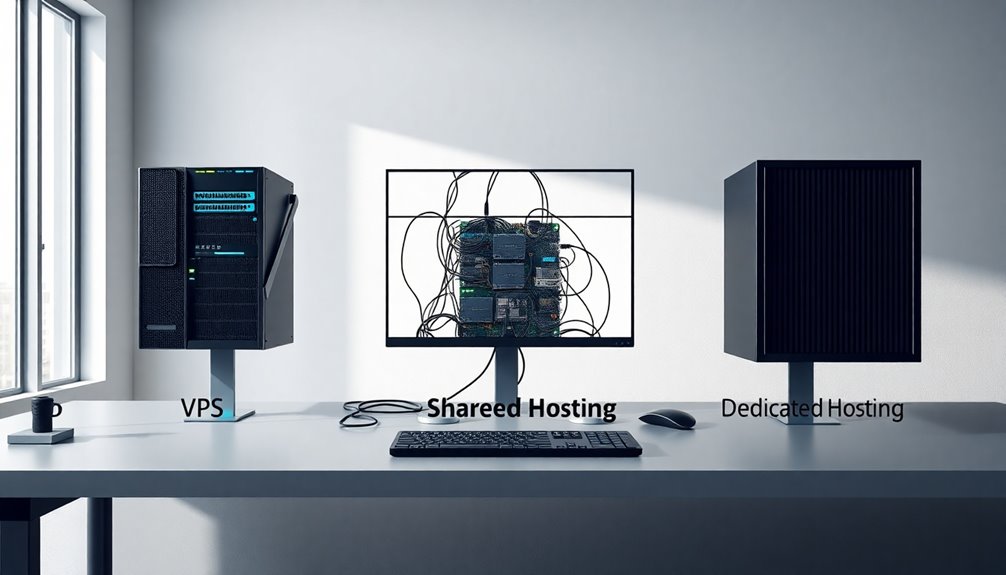When you're comparing VPS, shared, and dedicated hosting, it's crucial to match each option with your website's needs. Shared hosting is budget-friendly and great for low-traffic sites but may lead to performance issues. VPS hosting offers a balance of cost and control, providing dedicated resources for better performance. Dedicated hosting, while the most expensive, ensures the best speed and security for high-traffic sites. Each choice comes with unique benefits and drawbacks, leading you to explore more personalized options.
Key Takeaways
- Shared hosting is cost-effective and user-friendly, making it ideal for beginners and low-traffic websites.
- VPS hosting offers dedicated resources for better performance and security, suitable for growing websites with moderate traffic.
- Dedicated hosting provides exclusive access to server resources, ensuring optimal performance for high-traffic sites with specific needs.
- Security features vary significantly; shared hosting is more vulnerable compared to VPS and dedicated hosting solutions.
- Cost differences reflect the level of resources and customization; shared is the cheapest, followed by VPS, with dedicated hosting being the most expensive.
Understanding Shared Hosting

Shared hosting is an ideal solution for those starting their online journey or managing small to medium-sized websites. It allows multiple websites to share a single server and its resources, making it a cost-effective choice.
You'll find that most shared hosting plans come with user-friendly control panels, simplifying website management. Additionally, built-in security features like firewalls and SSL certificates help protect your site.
As your website grows, you can easily upgrade your plan to access more resources. The setup process is straightforward, requiring minimal technical knowledge, while your hosting provider handles server maintenance.
This means you can focus on creating content and design without worrying about the technical details.
Exploring VPS Hosting

If you're looking for a step up from shared hosting, VPS hosting might be the perfect solution for you.
VPS hosting involves a physical server split into multiple virtual servers, each with dedicated resources like CPU and RAM. This setup ensures that your site's performance and security aren't affected by other users.
With VPS, you gain more control and can customize server configurations, making it ideal for growing websites. Plus, resources can easily scale as your needs change.
While it costs more than shared hosting, it's still more affordable than dedicated options.
Ultimately, VPS hosting offers a balanced approach, delivering stable performance and flexibility without breaking the bank.
Advantages of Dedicated Hosting

When you choose dedicated hosting, you unlock a range of advantages that significantly enhance your website's performance and security.
You'll enjoy exclusive resources like CPU, RAM, and storage, which means no sharing with others—eliminating resource contention. This leads to faster load times, crucial for both SEO and user experience.
Dedicated hosting is perfect for high-traffic sites, ensuring stable operations even during spikes. You also gain advanced security features, such as DDoS protection and hardware firewalls, safeguarding your site from threats.
With full root access, you can customize your server environment to fit your needs. Plus, you can expect high uptime and 24/7 support, ensuring your website remains accessible and reliable at all times.
Key Differences Between Hosting Options

Understanding the key differences between hosting options can significantly impact your website's success.
Shared hosting means you share resources like CPU and memory with other users, which can lead to performance issues.
VPS hosting gives you dedicated resources, but you're still on shared hardware, limiting scalability.
In contrast, dedicated hosting provides exclusive access to all server resources, ensuring top-notch performance and security.
With dedicated servers, you can customize your resource allocation and scale as needed.
Security varies too; shared hosting is more vulnerable, while dedicated servers offer the highest protection.
Your choice should align with your website's needs, considering factors like traffic, performance, and technical expertise required for management.
Cost Comparison of Hosting Types

Choosing the right hosting type involves a careful evaluation of costs associated with each option.
Shared hosting is the most affordable, ideal for small websites with low traffic, but you'll face limitations in resources and scalability.
VPS hosting comes next, offering moderate pricing with more control and customization, which can be beneficial if you anticipate growth. Prices vary widely among providers, so it's worth shopping around.
Dedicated hosting is the priciest, providing full control and excellent performance, yet it's best for sites with high traffic and specific resource needs.
Always consider your budget constraints and the potential for future scalability when making your decision, as these factors significantly influence your overall costs.
Performance Analysis of Each Hosting Type

While cost is a significant factor in selecting a hosting type, performance plays an equally vital role in ensuring your website runs smoothly.
In shared hosting, multiple sites share resources, which can lead to slow load times and performance issues, especially under high traffic.
VPS hosting offers dedicated resources and greater control, making it suitable for growing businesses, although it still falls short of the performance levels of dedicated hosting.
With dedicated hosting, you get exclusive access to resources, ensuring top-notch performance and reliability, ideal for high-traffic sites.
Monitoring key performance indicators like CPU and memory usage is essential across all hosting types to optimize performance and enhance user experience.
Choose wisely based on your specific needs.
Security Considerations in Hosting

When selecting a hosting type, security should be a top priority, as each option presents unique risks and vulnerabilities.
Shared hosting can be particularly risky, since multiple websites share the same server. If one site gets compromised, others may be affected.
In contrast, VPS hosting offers better isolation, minimizing the impact of security breaches on neighboring sites.
With dedicated servers, you gain complete control over security measures, allowing custom configurations and firewalls.
While all hosting types face threats like DDoS attacks, VPS and dedicated options provide stronger defenses.
Choosing the Right Hosting for Your Needs

How do you determine the best hosting option for your website? Start by considering your budget.
If you're on a tight budget, shared hosting is the most affordable choice, ideal for small or new sites.
For growing websites needing more resources and scalability, VPS hosting strikes a balance between cost and performance.
If your site expects high traffic or requires maximum performance, dedicated hosting is the way to go, despite its higher cost.
Think about your resource needs too—shared hosting limits customization, while VPS allows for some flexibility, and dedicated hosting offers complete control.
Ultimately, assess your website's current needs and future growth to choose the right hosting solution that supports your goals.
Frequently Asked Questions
Can I Upgrade From Shared Hosting to VPS Easily?
You can't directly upgrade from shared hosting to VPS; you'll need to purchase a separate VPS plan.
The migration process involves backing up your website files, setting up the VPS, transferring your files and databases, and updating your DNS settings.
While it takes some technical know-how, the performance benefits and control you gain make it worth the effort.
Plus, VPS offers dedicated resources that shared hosting just can't provide.
What Kind of Websites Benefit From VPS Hosting?
If you're running an e-commerce site, a resource-intensive application, or a rapidly growing blog, VPS hosting's perfect for you.
It offers the performance you need, the customization you crave, and the security that keeps your data safe.
You'll benefit from dedicated resources, improved uptime, and the flexibility to adapt as your website evolves.
Plus, if you're aiming for better SEO, VPS hosting can significantly enhance your site's speed and reliability.
Is Technical Support Included With Dedicated Hosting Plans?
Yes, technical support is typically included with dedicated hosting plans.
You'll often find 24/7 availability, ensuring you get help whenever you need it. Experienced technicians assist with your server issues, and many providers offer free setup assistance.
You'll also benefit from rapid hardware replacement services to minimize downtime. Plus, you'll have options for live phone support, email, or ticket systems, giving you multiple ways to get the help you require.
How Does Traffic Affect Shared Hosting Performance?
Did you know that shared hosting traffic limits can range from 50,000 to 300,000 visits per month?
When your website exceeds these limits, you'll notice a significant drop in performance, leading to slower loading times and potential downtime.
Resources like CPU and RAM are shared among multiple sites, which means high traffic can quickly degrade your user experience.
To avoid these issues, consider optimizing your content and monitoring traffic regularly.
Are There Any Hidden Fees With VPS or Dedicated Hosting?
Yes, there are hidden fees with both VPS and dedicated hosting.
You might find initial prices attractive, but extra charges for management, support, and resource upgrades can quickly add up.
VPS plans often require technical expertise, leading to outsourced costs, while dedicated hosting may include setup and customization fees.
To avoid surprises, read the terms carefully, choose comprehensive plans, and monitor your resource usage regularly.
Conclusion
In the grand scheme of web hosting, each option has its own charm and quirks. While shared hosting is like cozying up in a bustling café, VPS offers a bit more privacy in a semi-private booth. Dedicated hosting, on the other hand, is like having your own luxurious office. By weighing your needs and budget, you'll find the perfect fit that feels just right. So, take the plunge and discover which hosting option will elevate your online presence!









